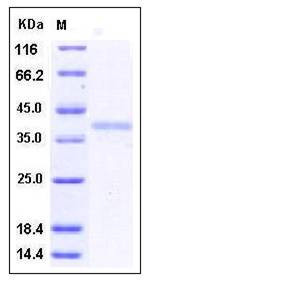Human Carbonic Anhydrase X / CA10 Protein
CA-RPX,CA10,CARPX,HUCEP-15
- 100ug (NPP1966) Please inquiry
| Catalog Number | P10687-HCCH |
|---|---|
| Organism Species | Human |
| Host | Human Cells |
| Synonyms | CA-RPX,CA10,CARPX,HUCEP-15 |
| Molecular Weight | The recombinant human CARPX consists of 285 amino acids and has a predicted molecular mass of 27.2 kDa. Due to glycosylation, the rhCARPX migrates as an approximately 38 kDa band in SDS-PAGE under reducing conditions. |
| predicted N | Gln 22 |
| SDS-PAGE |  |
| Purity | > 95 % as determined by SDS-PAGE |
| Protein Construction | The mature form of human CARPX (NP_001076002.1) (Met 1-Asn 300) with five amino acids (DDDDK) at the C-terminus was expressed and purified. |
| Bio-activity | Measured by its esterase activity. The specific activity is >100 pmoles/min/μg, as measured with 1 mM 4-Nitrophenyl acetate and 1 μg enzyme at 400 nm in 100 μL of 12.5 mM Tris, 75 mM NaCl, pH 7.5. |
| Research Area | Cardiovascular |Cardiovascular disease Therapeutic Targets |Hypertension Therapeutic Targets |
| Formulation | Lyophilized from sterile 100mM Glycine, 10mM NaCl, 50mM Tris, pH 7.5 1. Normally 5 % - 8 % trehalose and mannitol are added as protectants before lyophilization. Specific concentrations are included in the hardcopy of COA. |
| Background | Carbonic anhydrase X, also called carbonic anhydrase - related protein X (CARPX) and CA10, belongs to the CA family of zinc metalloenzymes which catalyze the reversible hydration of carbon dioxide in various biological processes such as respiration, renal tubular acidification and bone resorption. The secreted protein CARPX without CA activity (hydration of CO2) is identified as an acatalytic member of the alpha-carbonic anhydrase subgroup. CARP X expression is detected in the adult total brain and almost all parts of the central nervous system, but not in the fetal brain. Accordingly, CARP X is suggested to play a role in the development of central nervous system, especially the brain. The same CARP X protein are encoded by multiple transcript variants of this gene. |
| Reference |
